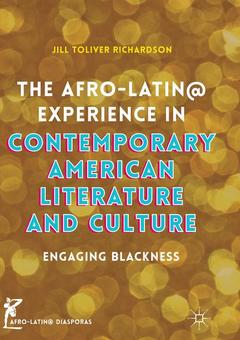Description
The Afro-Latin@ Experience in Contemporary American Literature and Culture, Softcover reprint of the original 1st ed. 2016
Engaging Blackness
Afro-Latin@ Diasporas Series
Author: Richardson Jill Toliver
Language: English
52.74 €
In Print (Delivery period: 15 days).
Add to cartPublication date: 04-2018
Support: Print on demand
52.74 €
In Print (Delivery period: 15 days).
Add to cartPublication date: 09-2016
Support: Print on demand
Description
/li>Contents
/li>Biography
/li>Comment
/li>
This bookexamines contemporary Afro-Latin@ literature and its depiction of the multifaceted identity encompassing the separate identifications of Americans and the often-conflicting identities of blacks and Latin@s. The Afro-Latin@ Experience in Contemporary American Literature and Culture highlights the writers? aims to define Afro-Latin@ identity, to rewrite historical narratives so that they include the Afro-Latin@ experience and to depict the search for belonging. Their writing examines the Afro-Latin@ encounter with race within the US and exposes the trauma resulting from the historical violence of colonialism and slavery.
Introduction.- Chapter One: Enduring the Curse: The Legacy of Inter-generational Trauma in Junot Díaz's The Brief Wondrous Life of Oscar Wao.- Chapter Two:Haunting Legacies: Forging Afro-Dominican Women’s Identity in Loida Maritza Pérez’s Geographies of Home.- Chapter Three:‘Boricua, Moreno’: Laying Claim to Blackness in the Post-Civil Rights Era.- Chapter Four: Afro-Latin Magical Realism, Historical Memory, Identity, and Space in Angie Cruz’s Soledad and Nelly Rosario’s Song of the Water Saints.- Chapter Five: Memory and the Afro-Cuban Missing Link in H.G. Carrillo’s Loosing My Espanish.- Conclusion: Conceptualizing Afro-Latinidad.
Jill Toliver Richardson is Assistant Professor of English at Borough of Manhattan Community College (CUNY), USA where she teaches Contemporary Urban Writers and Latina/o Literature and composition. She was a recipient of the Woodrow Wilson Career Enhancement Fellowship and has previously published in the journals Label Me Latina/o and CENTRO.




